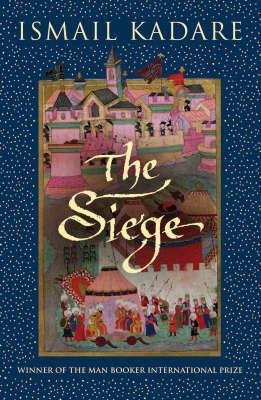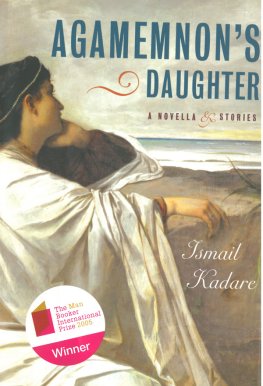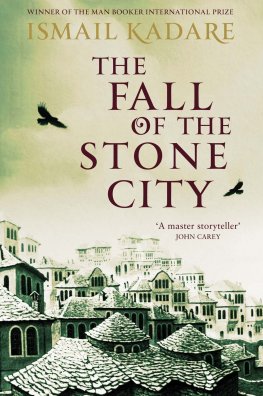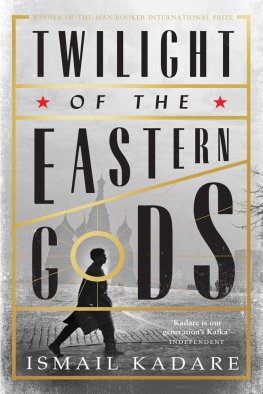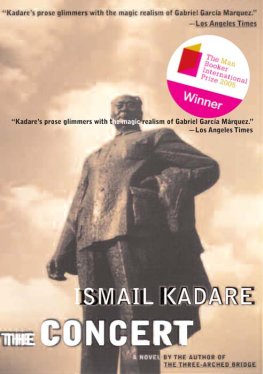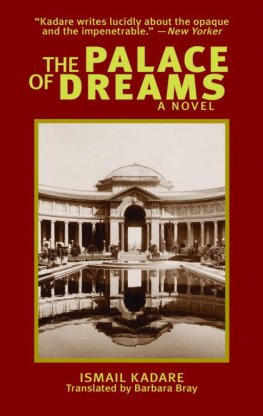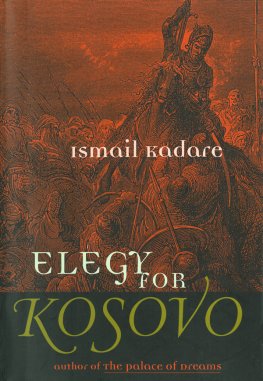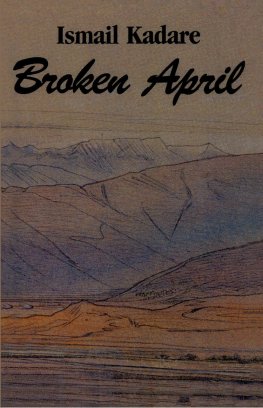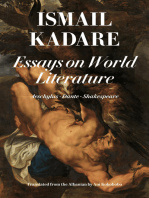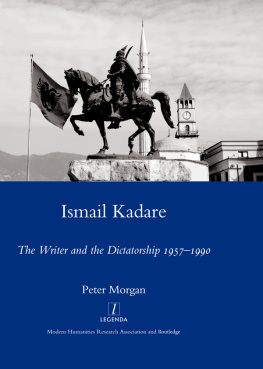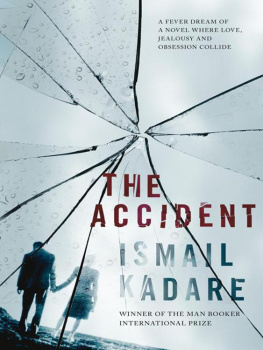Winner of the Man Booker International Prize
Extraordinary: an epic with the force of myth and the delicacy of a miniature. You could read The Siege every year for a lifetime and find something new each time a masterpiece.
The Telegraph (UK)
A thought-provoking book and a fine introduction to Kadares large body of work.
Winnipeg Free Press
Kadares attention to detail is remarkable. Another impressive work from one of the worlds finest writers.
The Herald (UK)
The urgent gestures towards something thats not quite said some-how make the story linger in the mind long after the regime under which The Siege was written went the way of the empire it dreams back to life.
The Guardian (UK)
The writing is lean, dressed sparingly with some vivid metaphors. After the weight of anxiety and anticipation, Kadare catches us up in the rush, panic and horror of battle. [He] knows, too, that a well-told tale withstands any attack on it. The Siege lives on for good reason.
The Globe and Mail
An impressively decorative novel in which war is at once horrible and beautiful, in which we see vividly the smashing of bodies to pulp and shattered bone and the waving of a thousand jewelembroidered banners.
Time Out London
The English Centre of International PEN, the worldwide association of writers, exists to uphold the values of literature, literacy and freedom of expression. The first PEN Club was founded in London in 1921 to promote intellectual co-operation and understanding among writers, to create a world community of writers that would emphasise the central role of literature in the development of world culture, and to defend literature against the modern worlds threats to its survival. As the worlds oldest human rights organisation and the oldest international literary organisation, PEN acts as a powerful voice on behalf of writers harassed, imprisoned and sometimes killed for their views. Membership of English PEN is open to all who are actively engaged in any branch of literature, regardless of nationality, race or religion. In accordance with its charter, PEN believes that literature knows no frontiers, and that it should remain a common currency between nations in spite of political and international upheavals.
ABOUT THE AUTHOR AND TRANSLATOR
ISMAIL KADARE was born in 1936 in Gjirokastr, in the south of Albania. His first novel, The General of the Dead Army, established him as a major new voice in literature, and translations of his novels have since been published in more than forty countries. Chronicle in Stone, The Successor, and Agamemnons Daughter are all available from Doubleday Canada. In 2005 he won the inaugural Man Booker International Prize.
DAVID BELLOS, Director of the Program in Translation at Princeton University, is the translator of Georges Perecs Life: A Users Manual and a winner of the Goncourt Prize for biography. He has translated seven of Ismail Kadares novels, and in 2005 was awarded the Man Booker International Prize for his translations of Kadares work.
All but a few of the named characters in this novel are Ottoman Turks, or members of the Ottoman Army. Where no conventional English transcriptions of their names, ranks or units exist, the spellings adopted by Ismail Kadare in the original Albanian text of this novel, or else those approved by him for this English edition, have been used. In some cases the spelling is identical between modern Turkish, modern Albanian, and modern English. For other cases, the following table of the main differences between the Albanian and the English alphabet may be helpful:
c
ts
as in
curtsy
ch
as in
church
gj
gy
as in
hogyard
j
y
as in
year
q
ky
as in
stockyard
or the
t
in
mature
x
dz
as in
adze
xh
j
as in
joke
zh
s
as in
measure
As winter fell away and the Sultans envoys departed, we realised that war was our ineluctable fate. They had pressured us in every way to accept being vassals of the Sultan. First they used flattery, promising us a part in governing their vast empire. Then they accused us of being renegades in the pay of the Frankish knights, that is to say, slaves of Europe. Finally, as was to be expected, they made threats.
You seem mighty sure of your fortresses, they said to us, but even if they are as sturdy as you think, well throttle you with an altogether more fearsome iron band hunger and thirst. At each season of harvest and threshing, the only seeded field youll see will be the sky, and your only sickle the moon.
And then they left. All through March their couriers galloped as fast as the wind bearing messages to the Sultans Balkan vassals, telling them either to persuade us to give in, or else to cut off all relations with us. As was to be expected, all were obliged to take the latter course.
We were alone and knew that sooner or later they would come. Many times in the past we had faced attacks from our enemies, but lying in wait of the mightiest army the world had ever known was a different matter. Our own minds were perpetually abuzz, but our prince, George Castrioti, was preoccupied beyond easy imagining. The inland castles and coastal keeps were ordered to repair their watchtowers and above all to build up stocks of arms and supplies. We did not yet know from which direction they would come, but in early June we heard that they had begun to march along the old Roman road, the Via Egnatia, so they were heading straight towards us.
One week later, as fate decreed that our castle would be the first defence against the invasion, the icon of the Virgin from the great church at Shkodr was brought to us. A hundred years before it had given the defenders of Durrs the strength to repulse the Normans. We all gave thanks to Our Immaculate Lady and felt calmer and stronger for it.
Their army moved slowly. It crossed our border in mid-June. Two days later George Castrioti came with Count Musaka to inspect the garrison one last time, and to give it his blessing. After issuing final instructions, he left the castle on Sunday afternoon, followed by his escort and the officers womenfolk and children, so as to place them in safety in the mountains.
We walked alongside them for a while without speaking. Then we made our adieus with much feeling and went back into the keep. From look-outs on our towers we watched them climb up to the Plain of the Cross, then we saw them re-emerge on the Evil Slope and finally disappear into the Windy Ravine. Then we closed the heavy outer doors, and the fortress seemed to have gone mute now that we could no longer hear the voices of our youngsters inside it. We also battened down the inner sets of doors and let silence reign over us.
On June 18, at daybreak, we heard the tolling of the bell. The sentinel on the East Tower announced that a yellowish cloud could be seen in the far distance. It was the dust kicked up by their horses.
The first Turkish troops came beneath the walls of the fortress on June 18. They spent the day pitching camp. By evening the entire army had still not arrived. New units kept on coming in. A thick layer of dust lay on men, shields, flags and drums, horses and wagons, and on the camels laden with bronze and heavy equipment. As soon as each marching group came on to the plain that lay before the garrison, officers from a special battalion would allocate a specific camping site, and the weary soldiers, under orders from their leaders, would busy themselves with setting up the tents before collapsing inside them, half-dead from fatigue.

